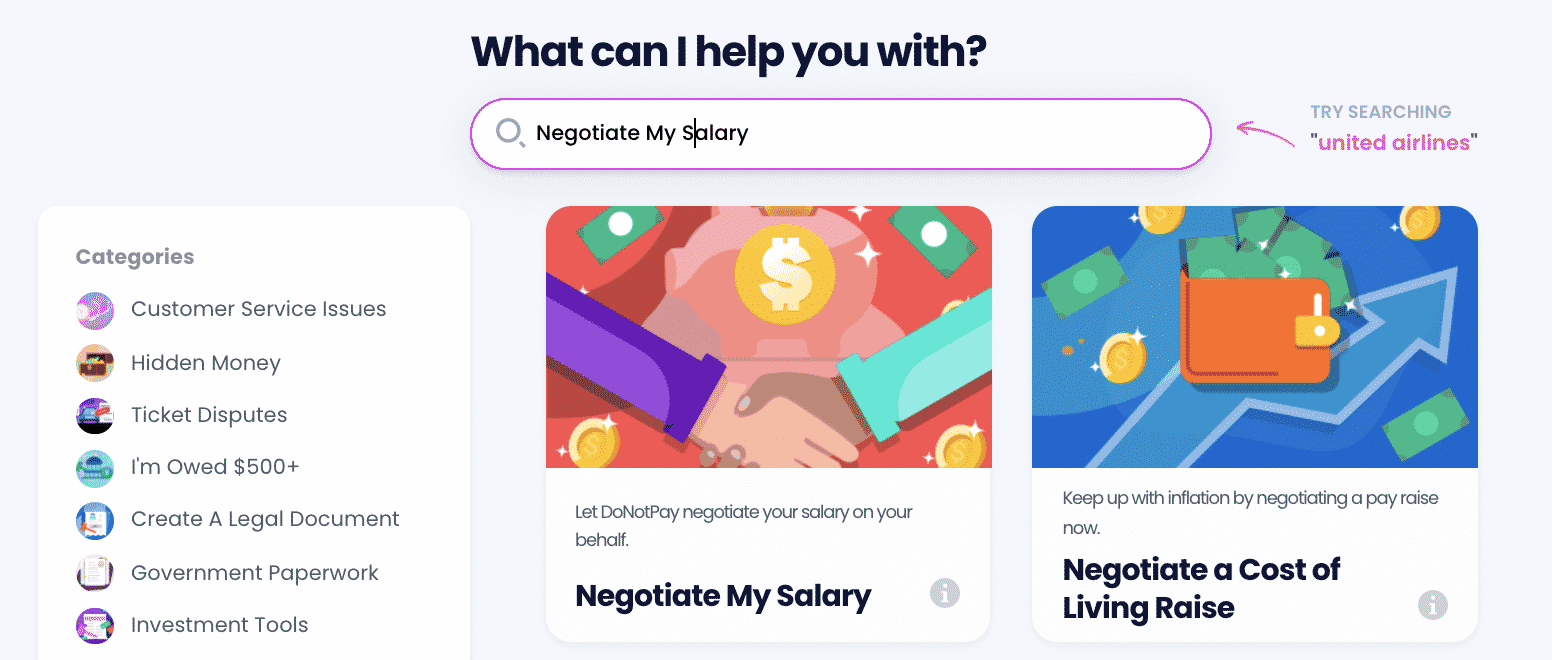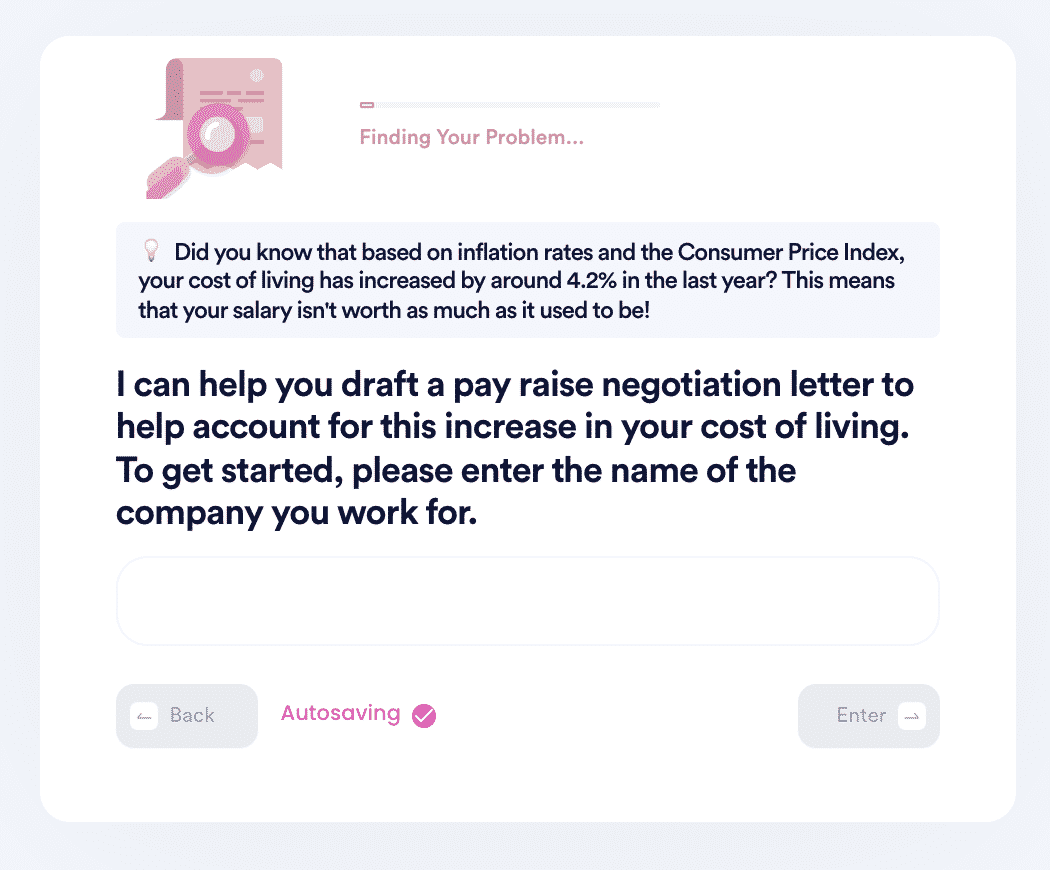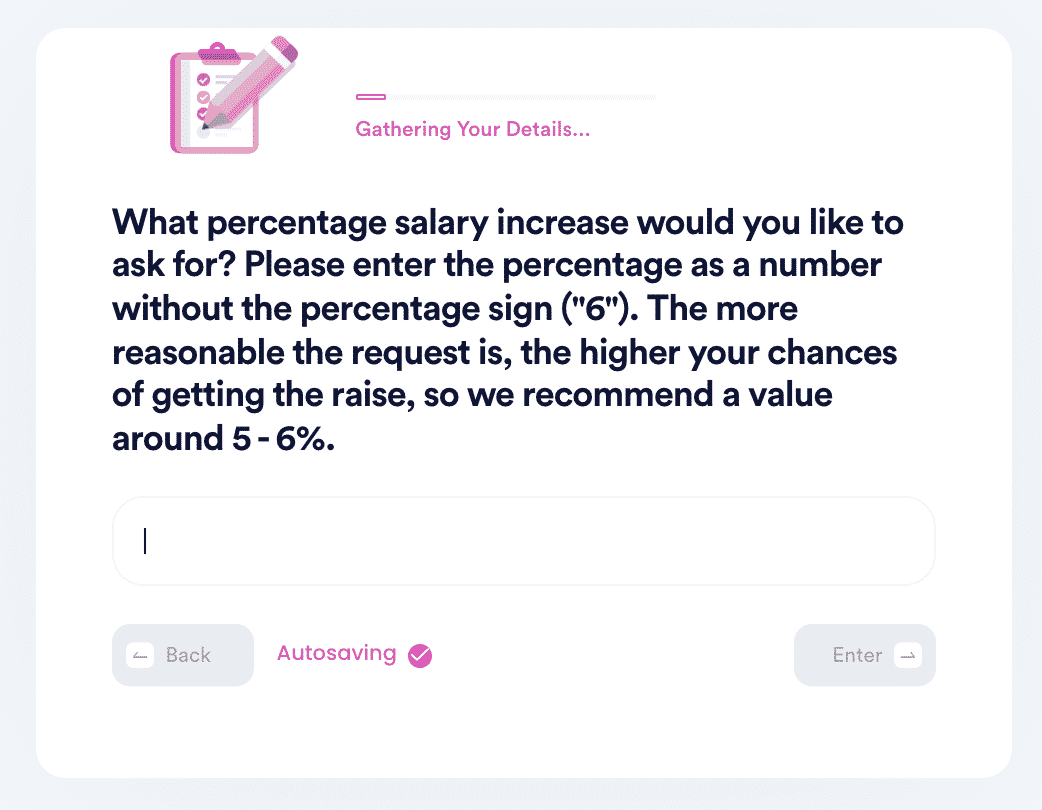Use This Sample Letter to Negotiate Your Salary After Receiving an Offer
The phase is critical after you have been offered the new position. Get the post-job-offer letter negotiation right, and you meet your two primary goals of a new job and the salary you want.
How to negotiate a salary after receiving the offer letter can be tricky. Prepare your negotiation properly, and you score a touchdown. DoNotPay has immense experience helping people negotiate successfully. DoNotPay provides information and advice on succeeding and solving problems in many areas.
Today, we will discuss the specific steps you take to negotiate your salary after you get the offer letter. We also provide additional background on salary negotiations in general, how to ask for a raise, and as an employee, when to ask for a raise, as well as how much to ask for, and how often you should get a raise.
Some Basics for Salary Negotiation After Receiving the Offer Letter
When you , you know you are the first choice. That does not mean the company or organization does not have a second applicant in mind if you do not accept their offer. It is important, therefore, to consider the following:
- Know how much time you have to reply to the offer letter and then respond within that time frame.
- Reply using the same medium. If the offer comes via email, send your salary negotiation response by email.
- If you receive the offer in a phone call, take the details and respectfully ask for time to consider, then call back and begin your salary negotiation response over the phone.
9 Steps to Negotiate a Salary After Receiving an Offer
Your goal is to accept the job offer with both sides feeling good about it all. You look forward to starting your new job, and the organization looks forward to having you on the team. These steps include all you need to know.
- Assume that your potential employer is like most employers and expects you to ask for a higher salary than the one offered. That means they expect to see both your response and how you present it.
- Get everything clear in your own mind. Review your original research into the organization, its market, your role, and comparable salary levels. If you prefer, .
- Begin your offer-letter response by saying how happy you are to be offered the job, how much you look forward to joining the team and contributing to the organization's future success. This approach will help them to see you as being reasonable and positive. It reinforces to the recipient that they made the right decision and that they should be positive in their response to what you say.
- Explain which positives, values, abilities, etc., you will bring to the role. This reinforces in their minds why they should do whatever they can to agree to your negotiation.
- State that, while you appreciate the salary level offered, it is not quite what you had expected.
- List the reasons for your statement. You will have researched the background and know-how their offer compares with similar positions in other organizations, the strength of the current market, and the value of what you are bringing to the role.
- Briefly state the importance of your role to them. Will you, for example, be saving them operational costs, increasing their market share, broadening their product base? Focus on the benefits you will bring and the specific reasons they chose you.
- Go into detail about your skill levels, talents, unique experience, past achievements, etc., that you bring to their organization, and how they will benefit from you working there.
- Specify the salary level you expect and why it is consistent with their reasons for hiring you.
You have options here. You may decide to:
| Provide one figure below which you will not accept the offer. | Only do this if you are confident in your request and certain that you will not accept anything less. |
| Provide a salary range. | This allows them to either accept your figure or to say why it cannot be that high to start, but within an agreed period or after specific results, your new salary level will be above your minimum. This clarifies the near future for both sides. |
Broaden the Negotiation
If they cannot agree to your salary demand (or if you want to offer flexibility as part of your negotiating strategy), see how else they can improve their offer. Your goal is to achieve a certain net income level. Income is made up of salary, other payments, and fewer outgoings. So, if they cannot raise the basic salary offer, move on to other things, such as
- An improved benefits package which will reduce your outgoings.
- More vacation time may be as acceptable to you as more money.
- Better stock options will convert into more wealth at some point.
- More remote working will save you time and gas money.
- Corporate-paid professional membership fees will reduce your outgoings.
- A better bonus package for achieving agreed goals gives you the incentive and the organization a strong reason to accept your demand.
Let DoNotPay Do It for You
Preparing, researching, and clarifying things before you respond with time and skill. Writing the salary negotiation letter or email takes experience. If you want to maximize your chances of success, you may choose to ask DoNotPay to do that heavy lifting for you. All you have to do is follow these four steps, then sit back and wait for DoNotPay to research and prepare your response.
- Search "negotiate my salary" on DoNotPay.

- Enter the name of your company and the industry you work in, so we can find the right wage statistics for your role.

- Answer a series of questions regarding your qualifications and achievements, relocation expenses, and other job offers if applicable.

- Enter the new base salary you would like to request.

And DoNotPay will Remember, DoNotPay works to help you decide whether you should negotiate your salary, how to get a raise once you are employed, as well as how to negotiate a salary increase by email.
What Else Can DoNotPay Do for You?
DoNotPay offers many series on many topics. For example,
- You can learn how to save money by maximizing refunds and chargebacks.
- Another way to lower outgoings is knowing how to lower your property taxes or how to cancel subscriptions at the end of a free trial.
- Going back to the workplace, many people consider their work environment less than friendly, so DoNotPay explains how to fight workplace discrimination.
Check out our series links and see all the ways we help, support, advise, and go into bat for our readers.
Offer Letter Salary Negotiation — Frequently Asked Questions
Can you lose a job offer by negotiating salary?
Yes, you can lose a job offer by demanding unreasonable compensation beyond the employer's budget and showing unprofessional behavior or attitudes that alienate the hiring manager.
How to reply to an offer letter to negotiate salary?
You can say something along the lines of "I'm very excited about the position and the opportunity to work for x company. Knowing that I can bring much value to your team, demonstrated by my x years of experience at x that we discussed during the interviews, I'm wondering if you would be willing to meet me at $x."


